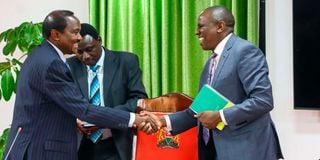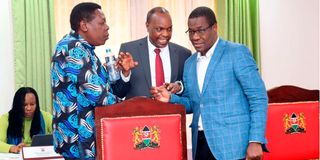
Azimio la Umoja One Kenya leader Raila Odinga (left) and President William Ruto. The two sides in the National Dialogue Committee are set to have separate meetings with President Ruto and Mr Odinga to debrief before the next engagement.
| Nation Media GroupPolitics
Premium
Bipartisan talks: Stalemate as Raila Odinga fresh demands threaten to derail talks with Ruto
What you need to know:
- The Nation has established that the retreat turned into a war of words that forced three Azimio members to walk out in protest.
- A member of the committee revealed that the two sides are set to have separate meetings with President Ruto and Azimio leader Raila Odinga for debriefing ahead of next engagement.
Talks between President William Ruto and Opposition leader Raila Odinga last evening hit a deadlock that threatens to collapse the negotiations should there be no compromise when the National Dialogue Committee meets next Wednesday.
A report-writing retreat in Machakos yesterday ended prematurely and in disarray after Opposition negotiators stuck to their initial demands and introduced fresh ones, including the scrapping of the housing levy, reduction of value added tax on petroleum products from 16 per cent to eight per cent, among other proposals aimed at bringing down the cost of living.
The Nation has established that the retreat turned into a war of words that forced three Opposition members — Democratic Action Party-Kenya leader Eugene Wamalwa, Nyamira Senator Okong’ o Mogeni and Malindi MP Amina Mnyazi to walk out in protest.
Only co-chair and Wiper leader Kalonzo Musyoka and National Assembly Minority Leader Opiyo Wandayi remained behind. President Ruto’s team stayed throughout the session.
Opposition outfit Azimio la Umoja One Kenya Coalition Party later declared a stalemate, forcing the meeting to adjourn.
A member of the committee last evening revealed that the two sides are set to have separate meetings with President Ruto and Mr Odinga for debriefing ahead of the next engagement.
In a document obtained by Nation and which formed the basis of yesterday’s heated discussions, the Opposition has demanded that the Finance Act, 2023 be reviewed by having the VAT on petroleum products reduced from 16 per cent to eight per cent.
But the Kenya Kwanza side insisted yesterday that its hands are tied because the 16 per cent VAT on fuel was part of the deal with the International Monetary Fund (IMF). The ruling alliance said they are not ready to open the matter for discussion.
The Opposition also demanded the scaling up and expansion of social protection programmes to cover more people with more money.
“The coalition suggests a substantial increase in the social protection budget. We propose providing adequate cash transfers to vulnerable households, expanding cash transfer programmes for the elderly, orphaned and vulnerable children, and people with severe disabilities,” the document reads in part.
The ruling alliance rejected this, citing lack of money to actualise its implementation. On the controversial housing levy, the Opposition wanted it scrapped or made voluntary among salaried Kenyans. But President Ruto’s side said the initiative is a key plank of the administration’s agenda that cannot be dropped.
“We encourage voluntary participation in affordable housing schemes, provision of tax incentives for construction, relief for first-time home-buyers and mortgage interest payments. The coalition opposes compulsory taxation for affordable housing,” said the coalition.
Sources told the Nation that Kenya Kwanza conceded to the reduction of the Road Maintenance Levy by Sh5, from the current Sh18 to Sh13. The ruling alliance also conceded Azimio's demand to reduce the anti-adulteration levy from Sh18 to Sh15.

National Dialogue Committee co-chairpersons Kalonzo Musyoka (left) representing the Azimio la Umoja One Kenya Coalition Party and Kimani Ichung’wah for the ruling Kenya Kwanza Alliance during the resumption of the bipartisan talks at the Bomas of Kenya in Nairobi in early August.
Other demands in the document include a proposal to reduce the Petroleum Development Levy by 50 per cent from Sh5.40 to Sh2.70 per litre, zero-rating VAT on basic food items, removing excise duties on locally-published books and educational materials.
Additionally, the Opposition has proposed reinstating 16 per cent VAT on transfer of business as a going concern, reinstating 16 per cent VAT on helicopters, helicopter parts and accessories.
A majority of taxation that Azimio wants reviewed took effect on July 1 following implementation of the Finance Act, 2023, which has made life more expensive while hitting businesses hard. Take-home pay for salaried Kenyans has also reduced significantly.
The document by Azimio shows how prices of basic commodities have gone up since Kenya Kwanza took over power last September. For instance, the price of a one-kilo packet of sugar has gone up by 61.4 per cent.
“Electricity tariffs have also steadily risen from the 2018 rates of Sh21.99 and 27.92 per KWh for small and large domestic consumers respectively to Sh26.10 and 31.75 per KWhy in 2023,” states the document.
Last evening, Mr Musyoka and National Assembly Majority Leader Kimani Ichung’wah announced that the team will have another roundtable meeting with Treasury Cabinet Secretary Njuguna Ndung’u next Wednesday to discuss some of the proposals.
This is the second time the talks have hit a stalemate at the report writing stage. Late last month, the team prematurely ended a retreat in Naivasha to have a roundtable meeting with economic experts at the Bomas of Kenya. Prof Ndung’u was one of the top government officials who appeared before the committee.
Mr Musyoka and Mr Ichungw’ah expressed optimism that the talks would yield the desired results. The two co-chairs said they expect to have a draft report by next Wednesday.
“It is important that we hear from the Treasury Cabinet Secretary to help us crack the matter. We have decided to confront the cost of living head on,” Mr Musyoka said yesterday.
Mr Ichung’wah said the team had made some good progress in dealing with the high cost of living and other agenda items.
“We have had extensive discussion on issues touching on the cost of living. But we have also found the need to have time out to make further consultations. There are proposals on the table that touch on taxation. These are some of the issues that we will engage the National Treasury on,” said Mr Ichung’wah.
The Opposition has indicated that it will reject the report should it fail to address the high cost of living. It is also keen on electoral reforms as well as protection of multi-party democracy. It wants rebel MPs within its ranks ousted to seek a fresh mandate from the people. Further, the Opposition wants Kenya Kwanza to slash domestic and internal travels by 30 per cent. The coalition says this will save a minimum of Sh230 billion annually.

Azimio members in the bipartisan talks, from left: DAP-K party leader Eugene Wamalwa, Jubilee Party Secretary-General Jeremiah Kioni and National Assembly Minority Leader Opiyo Wandayi at the Bomas of Kenya in Nairobi on September 1, 2023.
The document quotes National Treasury figures that place the amount of money spent by public officers at more than Sh193.2 billion in the last three months of 2022, for both domestic and international travel.
This, it says, translates to at least Sh772.8 billion per annum, or 20.7 per cent of the budget set aside for travels.
Azimio wants the budget for hospitality, office and general supplies reduced by between 25 per cent and 30 per cent.
This, the coalition says, will occasion a saving of not less than Sh120 billion.
Further, the coalition wants prisons de-congested from the current 66,000 inmates to its established capacity of 32,000.
The coalition argues that this will result into savings of Sh18 billion annually.
According to Azimio, as of December last year, Kenya's prison population stood at 66,000, with 23,000 in pre-trial detention, far exceeding the system's capacity of 34,000 prisoners.
“This not only burdens taxpayers but also violates constitutional standards of humane treatment. Surprisingly, Kenya, with a population of 52 million, incarcerates 66,000 individuals, whereas Tanzania, with 64 million people, holds only 32,000 prisoners,” states the document.
It adds: “Reducing the prison population from 66,000 to 32,000 would bring Kenya in line with international standards and save Sh18 billion annually in Correctional Services expenses. De-congesting prisons is also crucial for achieving a fair and just criminal justice system in the country.”
The Opposition wants the Appropriation Bill, 2023 scrutinised in view of the revelations by the Controller of Budget that some expenditures have been fraudulently budgeted for.
Azimio argues that the revelations that remunerations of top state officers have been inflated by three times is enough reason to have the Appropriation Bill, 2023 subjected to an audit.






